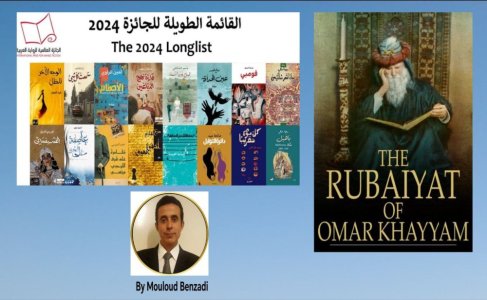The Book Fair is a significant event in the literary world, uniting publishers, authors, agents, and enthusiastic readers to celebrate the power of the written word. As the 2024 edition of The London Book Fair approaches, a recurring question arises—one that has echoed in numerous Western international book fairs, including the Frankfurt Book Fair in 2023: Why do Arabic books struggle to captivate the interest of Western readers?
Translation Obstacles Impede the Success of Novels Abroad
Arab publishers and writers commonly attribute the lack of success of Arabic literary works abroad to translations, asserting that inaccurate translations impede the appeal of Arabic books among Western readers.
While it is true that poor translations can negatively impact the quality of translated Arabic books, it would be unfair to lay blame on the numerous skilled professional translators who diligently follow established translation rules and standards. Translators have limited control over whether Arabic works meet the expectations of global readers.
Translation plays a crucial role in capturing the essence and intent of the original text, effectively conveying the same message and tone in the new language. It acts as a mirror, reflecting the thoughts and style of the writer. However, just as a mirror cannot beautify an unattractive picture, translators cannot dramatically alter the content or appeal of a book.
Today, there is a growing number of certified and reputable translation agencies in the Arab world that adhere to high standards. Arab publishers also have access to established translation agencies in the West, where native English speakers can ensure high-quality translations.
It is important to note that there is currently no solid evidence indicating widespread mistranslation of Arabic novels. If a writer or publisher believes a book has been poorly translated, they have the option to recall it and have the translation verified and corrected. However, there is no concrete evidence to suggest that amending the translation of an Arabic novel leads to a significant increase in book sales.
This suggests that there are other underlying factors beyond translation that contribute to the challenges faced by Arabic literature in attracting a global readership.

Decline of Readership and Restricted Literary Selections
One influential factor hindering the success of Arabic literature globally is the difficulty in identifying the right Arabic books that can capture attention abroad, especially amidst the limited range of literary choices and a decline in readership. Sherif Bakr, a respected Egyptian publisher, highlights the absence of a formula for an international bestseller in Arabic literature. He emphasizes the importance of Arab publishers adopting a laissez-faire approach, focusing on releasing a diverse range of works covering various topics. The National quoted him saying, "There is sometimes this trend among certain Arabic publishers to push a particular kind of book and then dedicate a lot of resources to it, instead of trying to focus on releasing a variety of works covering different topics."
In the Western publishing industry, various reliable methods and sources are employed to gather sales data, such as publishing industry tracking services, bookstore sales records, online retailer rankings, and bestseller lists compiled by newspapers, magazines, and literary organizations. Coupled with the high interest in reading literature in Western countries, these factors contribute to increased book sales. Conversely, readership is less prevalent in the Arab world. The lack of interest in literature has resulted in the closure of libraries and the shutting down of hundreds of bookshops that have, in many cases, been replaced by snack bars, restaurants, and entertainment centres. Additionally, Arabic publishing houses in both the Arab world and beyond have been forced to close. A recent example is the prominent Al Saqi bookstore, which opened in London in 1978 but closed its doors on December 31, 2022. Salwa Gaspard, the founder of Al Saqi Books, lamented the decline in Arab visitors to the UK and the decrease in book purchases by Arabic libraries. Gaspard also noted a generational issue, with younger people not frequenting bookstores as their parents did.
The Negative Impact of Literary Prizes on Arabic Literature
The influence of literary prizes on Arabic literature presents another significant factor contributing to the challenges faced by Arabic books abroad. While literary awards provide valuable recognition, financial support, and increased visibility, they have also led to a narrowing effect on literary choices within the Arab world. Authors have increasingly tailored their works to align with the preferences of regional literary awards committees, focusing on securing local recognition rather than appealing to global audiences. This trend has confined their literary works to themes that are more suited to local and regional interests, limiting their international appeal.
The enthusiasm for literary awards has undeniably reshaped the landscape of Arabic literature, ushering in an era dominated by the pursuit of literary accolades, which deserves to be designated as the Literary Awards Literature Era.
While literary awards have the potential to spark and nurture literary creativity, they also have the potential to stifle it. Arabic literary prizes have propelled certain Arab writers to fame in the Arab world, yet they have simultaneously hindered the global success of Arabic novels. The topics and themes favored by these awards often struggle to resonate with readers outside the Arab world, who have access to a diverse array of literary options from around the globe. Consequently, award-winning novels in the Arab world encounter challenges in gaining recognition on an international scale due to their limited appeal to broader audiences. This situation serves as a clear signal for a re-evaluation of the approach to guide Arabic novels towards achieving universality and broader international resonance.
Stereotypes and Misconceptions about Arabic Literature
Another factor believed to be behind the failure of sales of Arabic novels outside the Arab world is the prevalence of stereotypes and misconceptions about Arabic literature. Critics argue that one common stereotype is the perception that Arabic literature solely revolves around religious or political topics, disregarding its diverse range of themes and genres such as romance, history, fantasy, and science fiction. They highlight the works of renowned Egyptian author Naguib Mahfouz, particularly his novel "Children of Gebelawi," which explores themes of love, identity, and societal challenges, offering a nuanced portrayal of Egyptian society beyond religious or political contexts.
It is essential to recognize that Naguib Mahfouz belonged to a different era, alongside other influential figures in Arabic literature who have left an indelible mark on history. They engaged in spontaneous writing, expressing their thoughts, emotions, depicting their experiences, and reflecting the society around them. Their works addressed universal themes that readers worldwide can identify with.
The year 1988, which marked the passing of the internationally acclaimed writer Mikhail Naimy and the first-ever Nobel Prize for Literature awarded to an Arab writer, signals the emergence of a new era in Arabic literature characterized by a growing preoccupation with literary awards. This momentous event signifies the onset of a distinct chapter in the history of Arabic literature that should be referred to by future generations as "Literary Awards Literature." This trend is set to persist until writers are no longer swayed or distracted by the allure of literary awards.
Cultural Disparities and Misinterpretation
Analysts refer to another misconception, which is that Arabic novels are inaccessible to non-Arabic readers due to differences in cultural backgrounds and writing styles. These analysts argue against that, citing successful translated works such as Lebanese novelist Hanan al-Shaykh's "The Story of Zahra" or Algerian author YasminaKhadra's "The Attack." They state that these novels have successfully captured international audiences, proving that Arabic literature can transcend cultural borders and offer universal narratives.
However, these remarkable works are outliers considering the vast number of countries that comprise the Arab world and the abundance of active writers within it. Additionally, YasminaKhadra is actually a French writer who has embraced a Western style in his writing. Having resided in France and immersed in the French language and Western culture, the influence of the West is evident in his works, making them more aligned with Western literary traditions rather than the Arab world.
Another example that shows the importance of adjusting our writings to Western culture is the success of Omar Khayyam's "The Rubaiyat" in the West. FitzGerald's translations of Khayyam's verses took considerable liberties in adapting the original Persian texts to fit Western tastes, cultural references, and poetic styles, and that was the secret of its success. I also defend this position based on my own experience. When people ask me how cultural differences can affect the success of Arabic works in the West, I tell them that an Arabic joke can elicit uproarious laughter from an Arab audience while failing to evoke any reaction from a Western audience. This applies to literature as well. When I posted quotes from my works translated into English, they didn't capture much attention. In contrast, when I shared quotes from my upcoming English novel, written while thinking in English, they gained international recognition and appeared on numerous websites and references. These examples urge us to reevaluate not just our writing style but also our mindset and approach to communication in order to effectively connect with and resonate with others.
Globalizing Arabic Literature
In spite of the numerous obstacles, it is indisputable that Arabic literature holds the potential to surmount these challenges and advance towards a universal standing. However, realizing this potential necessitates a reformation and a deliberate redirection of Arabic literature. This shift should steer away from the allure of literary accolades and local themes, and instead embrace more diverse and global themes that can resonate with a worldwide audience, contributing to universal knowledge and values. The assessment of Arabic literature by The Guardian in 2004 remains pertinent, as it rightly questioned the contribution of Arabic literature to knowledge, understanding, and the proliferation of new ideas. The Guardian accurately described the state of Arabic literature in 2004, stating, "Regardless of how many books are actually published in the Arab world, a more relevant question is how many are worth reading. What do they contribute by way of useful knowledge, understanding, or the spread of new ideas? All these qualities will be essential if reform in the Arab world is to have any hope of succeeding." Regrettably, little progress has been made since then, and the lingering queries put forth by The Guardian continue to demand attention and resolution.
The challenges confronting Arabic literature transcend mere translation issues. There is a need to explore novel strategies to captivate a global readership, employing a flexible and adaptive approach. The emphasis should be on universal themes and shared human experiences that can bridge the cultural divide between the Arab world and the West.
Translation Obstacles Impede the Success of Novels Abroad
Arab publishers and writers commonly attribute the lack of success of Arabic literary works abroad to translations, asserting that inaccurate translations impede the appeal of Arabic books among Western readers.
While it is true that poor translations can negatively impact the quality of translated Arabic books, it would be unfair to lay blame on the numerous skilled professional translators who diligently follow established translation rules and standards. Translators have limited control over whether Arabic works meet the expectations of global readers.
Translation plays a crucial role in capturing the essence and intent of the original text, effectively conveying the same message and tone in the new language. It acts as a mirror, reflecting the thoughts and style of the writer. However, just as a mirror cannot beautify an unattractive picture, translators cannot dramatically alter the content or appeal of a book.
Today, there is a growing number of certified and reputable translation agencies in the Arab world that adhere to high standards. Arab publishers also have access to established translation agencies in the West, where native English speakers can ensure high-quality translations.
It is important to note that there is currently no solid evidence indicating widespread mistranslation of Arabic novels. If a writer or publisher believes a book has been poorly translated, they have the option to recall it and have the translation verified and corrected. However, there is no concrete evidence to suggest that amending the translation of an Arabic novel leads to a significant increase in book sales.
This suggests that there are other underlying factors beyond translation that contribute to the challenges faced by Arabic literature in attracting a global readership.

Decline of Readership and Restricted Literary Selections
One influential factor hindering the success of Arabic literature globally is the difficulty in identifying the right Arabic books that can capture attention abroad, especially amidst the limited range of literary choices and a decline in readership. Sherif Bakr, a respected Egyptian publisher, highlights the absence of a formula for an international bestseller in Arabic literature. He emphasizes the importance of Arab publishers adopting a laissez-faire approach, focusing on releasing a diverse range of works covering various topics. The National quoted him saying, "There is sometimes this trend among certain Arabic publishers to push a particular kind of book and then dedicate a lot of resources to it, instead of trying to focus on releasing a variety of works covering different topics."
In the Western publishing industry, various reliable methods and sources are employed to gather sales data, such as publishing industry tracking services, bookstore sales records, online retailer rankings, and bestseller lists compiled by newspapers, magazines, and literary organizations. Coupled with the high interest in reading literature in Western countries, these factors contribute to increased book sales. Conversely, readership is less prevalent in the Arab world. The lack of interest in literature has resulted in the closure of libraries and the shutting down of hundreds of bookshops that have, in many cases, been replaced by snack bars, restaurants, and entertainment centres. Additionally, Arabic publishing houses in both the Arab world and beyond have been forced to close. A recent example is the prominent Al Saqi bookstore, which opened in London in 1978 but closed its doors on December 31, 2022. Salwa Gaspard, the founder of Al Saqi Books, lamented the decline in Arab visitors to the UK and the decrease in book purchases by Arabic libraries. Gaspard also noted a generational issue, with younger people not frequenting bookstores as their parents did.
The Negative Impact of Literary Prizes on Arabic Literature
The influence of literary prizes on Arabic literature presents another significant factor contributing to the challenges faced by Arabic books abroad. While literary awards provide valuable recognition, financial support, and increased visibility, they have also led to a narrowing effect on literary choices within the Arab world. Authors have increasingly tailored their works to align with the preferences of regional literary awards committees, focusing on securing local recognition rather than appealing to global audiences. This trend has confined their literary works to themes that are more suited to local and regional interests, limiting their international appeal.
The enthusiasm for literary awards has undeniably reshaped the landscape of Arabic literature, ushering in an era dominated by the pursuit of literary accolades, which deserves to be designated as the Literary Awards Literature Era.
While literary awards have the potential to spark and nurture literary creativity, they also have the potential to stifle it. Arabic literary prizes have propelled certain Arab writers to fame in the Arab world, yet they have simultaneously hindered the global success of Arabic novels. The topics and themes favored by these awards often struggle to resonate with readers outside the Arab world, who have access to a diverse array of literary options from around the globe. Consequently, award-winning novels in the Arab world encounter challenges in gaining recognition on an international scale due to their limited appeal to broader audiences. This situation serves as a clear signal for a re-evaluation of the approach to guide Arabic novels towards achieving universality and broader international resonance.
Stereotypes and Misconceptions about Arabic Literature
Another factor believed to be behind the failure of sales of Arabic novels outside the Arab world is the prevalence of stereotypes and misconceptions about Arabic literature. Critics argue that one common stereotype is the perception that Arabic literature solely revolves around religious or political topics, disregarding its diverse range of themes and genres such as romance, history, fantasy, and science fiction. They highlight the works of renowned Egyptian author Naguib Mahfouz, particularly his novel "Children of Gebelawi," which explores themes of love, identity, and societal challenges, offering a nuanced portrayal of Egyptian society beyond religious or political contexts.
It is essential to recognize that Naguib Mahfouz belonged to a different era, alongside other influential figures in Arabic literature who have left an indelible mark on history. They engaged in spontaneous writing, expressing their thoughts, emotions, depicting their experiences, and reflecting the society around them. Their works addressed universal themes that readers worldwide can identify with.
The year 1988, which marked the passing of the internationally acclaimed writer Mikhail Naimy and the first-ever Nobel Prize for Literature awarded to an Arab writer, signals the emergence of a new era in Arabic literature characterized by a growing preoccupation with literary awards. This momentous event signifies the onset of a distinct chapter in the history of Arabic literature that should be referred to by future generations as "Literary Awards Literature." This trend is set to persist until writers are no longer swayed or distracted by the allure of literary awards.
Cultural Disparities and Misinterpretation
Analysts refer to another misconception, which is that Arabic novels are inaccessible to non-Arabic readers due to differences in cultural backgrounds and writing styles. These analysts argue against that, citing successful translated works such as Lebanese novelist Hanan al-Shaykh's "The Story of Zahra" or Algerian author YasminaKhadra's "The Attack." They state that these novels have successfully captured international audiences, proving that Arabic literature can transcend cultural borders and offer universal narratives.
However, these remarkable works are outliers considering the vast number of countries that comprise the Arab world and the abundance of active writers within it. Additionally, YasminaKhadra is actually a French writer who has embraced a Western style in his writing. Having resided in France and immersed in the French language and Western culture, the influence of the West is evident in his works, making them more aligned with Western literary traditions rather than the Arab world.
Another example that shows the importance of adjusting our writings to Western culture is the success of Omar Khayyam's "The Rubaiyat" in the West. FitzGerald's translations of Khayyam's verses took considerable liberties in adapting the original Persian texts to fit Western tastes, cultural references, and poetic styles, and that was the secret of its success. I also defend this position based on my own experience. When people ask me how cultural differences can affect the success of Arabic works in the West, I tell them that an Arabic joke can elicit uproarious laughter from an Arab audience while failing to evoke any reaction from a Western audience. This applies to literature as well. When I posted quotes from my works translated into English, they didn't capture much attention. In contrast, when I shared quotes from my upcoming English novel, written while thinking in English, they gained international recognition and appeared on numerous websites and references. These examples urge us to reevaluate not just our writing style but also our mindset and approach to communication in order to effectively connect with and resonate with others.
Globalizing Arabic Literature
In spite of the numerous obstacles, it is indisputable that Arabic literature holds the potential to surmount these challenges and advance towards a universal standing. However, realizing this potential necessitates a reformation and a deliberate redirection of Arabic literature. This shift should steer away from the allure of literary accolades and local themes, and instead embrace more diverse and global themes that can resonate with a worldwide audience, contributing to universal knowledge and values. The assessment of Arabic literature by The Guardian in 2004 remains pertinent, as it rightly questioned the contribution of Arabic literature to knowledge, understanding, and the proliferation of new ideas. The Guardian accurately described the state of Arabic literature in 2004, stating, "Regardless of how many books are actually published in the Arab world, a more relevant question is how many are worth reading. What do they contribute by way of useful knowledge, understanding, or the spread of new ideas? All these qualities will be essential if reform in the Arab world is to have any hope of succeeding." Regrettably, little progress has been made since then, and the lingering queries put forth by The Guardian continue to demand attention and resolution.
The challenges confronting Arabic literature transcend mere translation issues. There is a need to explore novel strategies to captivate a global readership, employing a flexible and adaptive approach. The emphasis should be on universal themes and shared human experiences that can bridge the cultural divide between the Arab world and the West.





